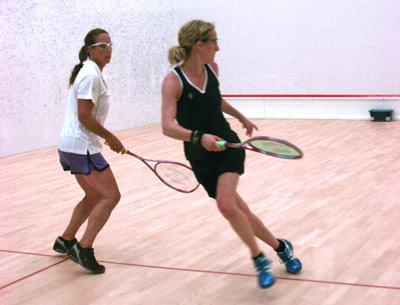WILSON CUP: Women Help Squash Grow

Sixteen of the best professional women squash players in the world — from Australia, England, Canada, and the United States — mixed deep lobs with whacks down the rail and nicks up front before appreciative audiences at the Elmaleh-Stanton courts at the Southampton Recreation Center this past weekend.
The cavernous doubles court at S.Y.S., as it is colloquially known, is one of the few in this country accessible to the public, and Victor Elmaleh and Wally Glennon’s intent to popularize the rapid four-wall racket sport’s singles and doubles versions drew the attention recently of Narelle Krizek, who five years ago founded the 40-strong women’s doubles pro tour.
It was the first time that the Women’s Doubles Squash Tour had contested an event here. Usually, it makes its stops in cities, as it did this year in Los Angeles, Denver, Chicago, Philadelphia, and New York. Vero Beach, Fla., is to be added next year.
Southampton Squash Inc., “a program targeted at bringing squash to members of the local community who are unable to afford to play squash,” was the beneficiary of the event, which, besides the $20,000 Wilson Cup pro-pro tourney, included two pro-ams.
Krizek, a native of Brisbane, Australia, who now runs the squash program at the Lawrenceville preparatory school in New Jersey, teamed with the English-born Suzie Pierrepont to edge Krizek’s sister, Natarsha McElhinny, and the tour’s top-ranked player, Stephanie Hewitt, a Canadian, in the final, winning the deciding fifth game. The scores were 13-16, 15-8, 18-17, 11-15, 15-11. The winners took home $2,000, and the runners-up $1,400. Southampton Squash received $3,000.
That a number of the women seen dashing about the court, chasing down lobs and stretching to retrieve reverse angles and three-wall boasts, were mothers of two or three children made their efforts all the more arresting.
Krizek, who has two children, and her sister, who has three, won the United States national doubles championship last year.
“It’s good for the kids, boys especially, to see their moms competing at such a high level,” said Krizek.
Asked about the game, which is played with a hard ball — singles has since the 1980s used a soft ball — she said, “It would be impossible to play with the soft ball. . . . It’s lob-shoot, lob-shoot. You want to get them out of position and, when there’s an opening, finish them off with a side wall-front wall reverse angle or with a side wall-front wall-side wall boast. You try to stretch them. The men’s game is attack, attack. The women’s game is more finesse.”
When Krizek turned to Bryan Fitzpatrick, who was to go on to win the Talmage pro-am with McElhinny, and asked him if he preferred playing doubles with women, he readily replied, “Absolutely.”
“And we’re cuter too,” Krizek said with a smile.
With four people exchanging shots in such a relatively small area, you would think let calls would be frequent, but, at least in the pro game, they are rare. “We don’t get hit,” said Krizek, alluding to a rule that awards a point to the ball striker should he or she hit an opponent blocking their way to the front wall. “We’re not taking it for the team.”
In the final, Pierrepont, who lives in Connecticut now, and who has a long reach, and McElhinny, who lives in Las Vegas and is small and quick, played the left wall, while Krizek, the tour’s third-ranked player at the moment, though she has been number-one, and Hewitt played the right.
“Often, the player with the stronger backhand plays the left wall,” Joyce Davenport, a Philadelphia pro, said as she watched a pro-am Saturday afternoon that paired Amy Milanek and Emily Stieff against Victoria Simmonds and Nadia Jihad. “But in this case, the amateurs [Stieff and Jihad] chose the left.”
Elmaleh, a former national men’s doubles champion, whose gift enabled the four singles and one doubles court to be built at S.Y.S., was one of Saturday’s spectators. When asked how old he was now, he answered, “Ninety-three and a half.” He had yet, he added, to be defeated in the half-court game he’s devised.
When S.Y.S.’s pro, the Egyptian-born Sayed Selim, said, “The last time we played he beat me 2-1,” Elmaleh, with a twinkle in his eye, corrected him. “Two-love.”
